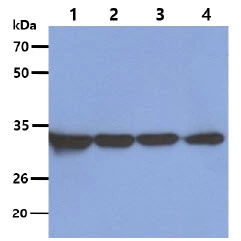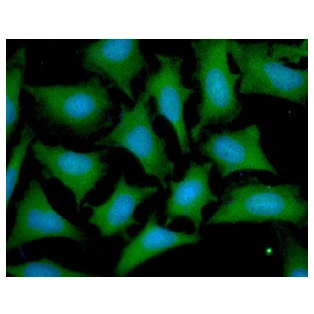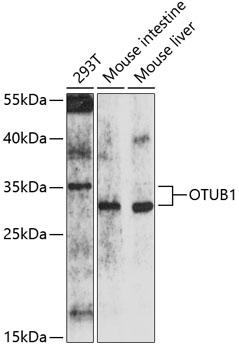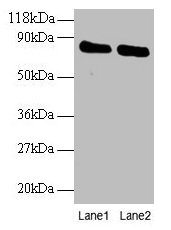
WB analysis of various samples using GTX57636 OTUB1 antibody. Lane 1 : A549 whole cell lysate Lane 2 : HeLa whole cell lysate Lane 3 : HepG2 whole cell lysate Lane 4 : 293T whole cell lysate Loading : 40 μg Dilution : 1:5000
OTUB1 antibody [AT17E10]
GTX57636
ApplicationsImmunoFluorescence, Western Blot, ImmunoCytoChemistry
Product group Antibodies
ReactivityHuman
TargetOTUB1
Overview
- SupplierGeneTex
- Product NameOTUB1 antibody [AT17E10]
- Delivery Days Customer9
- ApplicationsImmunoFluorescence, Western Blot, ImmunoCytoChemistry
- CertificationResearch Use Only
- ClonalityMonoclonal
- Clone IDAT17E10
- Concentration1 mg/ml
- ConjugateUnconjugated
- Gene ID55611
- Target nameOTUB1
- Target descriptionOTU deubiquitinase, ubiquitin aldehyde binding 1
- Target synonymsHSPC263, OTB1, OTU1, ubiquitin thioesterase OTUB1, OTU domain, ubiquitin aldehyde binding 1, OTU domain-containing ubiquitin aldehyde-binding protein 1, OTU-domain Ubal-binding 1, deubiquitinating enzyme OTUB1, otubain-1, ubiquitin-specific protease otubain 1, ubiquitin-specific-processing protease OTUB1
- HostMouse
- IsotypeIgG1
- Protein IDQ96FW1
- Protein NameUbiquitin thioesterase OTUB1
- Scientific DescriptionThe product of this gene is a member of the OTU (ovarian tumor) superfamily of predicted cysteine proteases. The encoded protein is a highly specific ubiquitin iso-peptidase, and cleaves ubiquitin from branched poly-ubiquitin chains but not from ubiquitinated substrates. It interacts with another ubiquitin protease and an E3 ubiquitin ligase that inhibits cytokine gene transcription in the immune system. It is proposed to function in specific ubiquitin-dependent pathways, possibly by providing an editing function for polyubiquitin chain growth. Alternative splicing results in multiple transcript variants. [provided by RefSeq, Jul 2008]
- ReactivityHuman
- Storage Instruction-20°C or -80°C,2°C to 8°C
- UNSPSC41116161








![Various whole cell extracts (30 μg) were separated by 12% SDS-PAGE, and the membrane was blotted with OTUB1 antibody [N1C1] (GTX101973) diluted at 1:1000. The HRP-conjugated anti-rabbit IgG antibody (GTX213110-01) was used to detect the primary antibody, and the signal was developed with Trident ECL plus-Enhanced.](https://www.genetex.com/upload/website/prouct_img/normal/GTX101973/GTX101973_39694_20220930_WB_H_M_R_22101319_150.webp)
